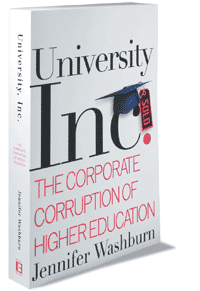
The biotech revolution was born in 1973, when a biochemist from the University of California at San Francisco and a geneticist from Stanford perfected a technique for inserting a toad’s DNA into a bacterium. The newly created life-form not only lived, but reproduced, and inspired the biochemist, Herbert Boyer, to found a startup he called Genentech. With UCSF’s blessing, he initially ran the company out of his university lab and soon became fabulously wealthy. So did U.C. and Stanford, which eventually raked in $300 million by licensing the gene-splicing technology to all comers.
This insertion of corporate practices into the academy also yielded a new organism, one that has replicated with great success: the American university reengineered as a bottom-line-oriented big business. Jennifer Washburn’s University, Inc. is a painstakingly detailed chronicle of how the free market has penetrated the inner sanctum of higher learning. Schools routinely sell off their research to the highest bidder in deals totaling as much as $1 billion a year. Washburn, who first reported on this trend in an Atlantic Monthly cover story five years ago, believes this partnership of the university with industry is a dangerous development. Not only does it divert universities from their educational goals, but it threatens the public welfare by taking scientific knowledge out of the public domain and placing it under corporate lock and key.
This recent history looks even more bleak when you consider the flowering of publicly funded research in the years after Sputnik unleashed a wave of rocket envy. On the premise that good science made for a strong country, the National Science Foundation’s budget for sponsoring open-ended academic research increased 30-fold between 1956 and 1966. These years were what Washburn calls a “golden age of federal support for higher education,” a time when public money subsidized research that industry was free to use, but over which it exercised little influence.
But as Boyer was splicing genes in the mid-1970s, anxiety was growing in the halls of power about the erosion of America’s dominance of world manufacturing. The information economy was emerging, and both government and industry were demanding innovation at a much faster pace than campuses were used to. At the same time, reduced tax revenues put the brakes on government generosity toward the academy. Major universities, once wary of getting involved with private enterprise, were now driven into its arms. The distinction between pure and applied science started to collapse.
Before long, “technology transfer” offices sprang up to preside over deals like the one in which the University of Florida sold the rights to a concoction developed for its football team. That product, Gatorade, has since netted the school nearly $95 million. Accelerating the trend in 1980, Congress granted universities an unlimited right to patent and license their research, making knowledge generated on their campuses their private property—even if it was publicly funded. With incentives like these, the academic-industrial complex became a juggernaut, with universities cashing in on their traditional role as repositories of knowledge. To take just one recent example: Stem cell lines have been developed at taxpayer expense, but researchers can gain access to them only by paying expensive licensing fees to the universities that control them.
Washburn describes some of the casualties of this revolution, like the University of South Florida grad student who ended up on a chain gang after he developed his own wastewater-treatment method in violation of his lab’s exclusive contract with a private company. And she presents an extended case study of the takeover of America’s medical schools by the pharmaceutical industry, which now funds 80 percent of all clinical trials in the country. As the recent controversy over the link between teen suicide and antidepressant use makes clear, drug companies use these arrangements to control what patients (and doctors) know about the drugs they are using.
University, Inc. illustrates just what is at stake here: not only public health but the “knowledge commons” that once was one of the greatest achievements of modernity. “Bit by bit,” Washburn writes, “the academic community’s insistence on continuing to treat basic knowledge as a commodity has all but undermined its role as the guardian of the public domain.”
Washburn resists the temptation to sentimentalize this loss. She prefers dry statistics and bloodless logic to fiery rhetoric urging the restoration of an academic arcadia gone by. That’s too bad, because University, Inc. is the kind of massive undertaking that should be driven by a passionate call to action. Even if she has muffled her voice, Washburn’s compendium of accusations about “the corporate corruption of higher education” drives home a disturbing lesson: If the institution that conservatives insist is the last bastion of liberalism has been so thoroughly bought and sold, then the privatization of everything is nearly complete.
















